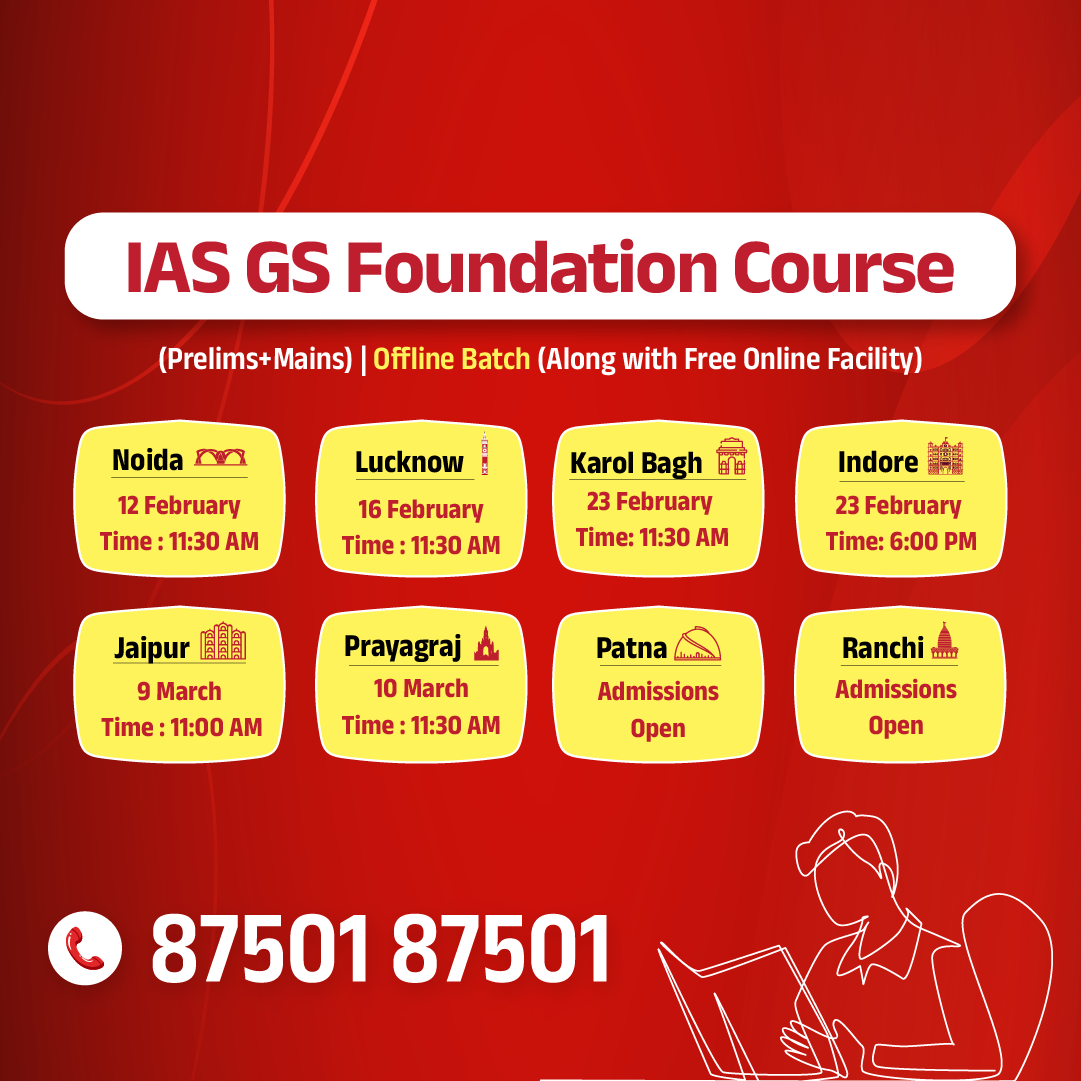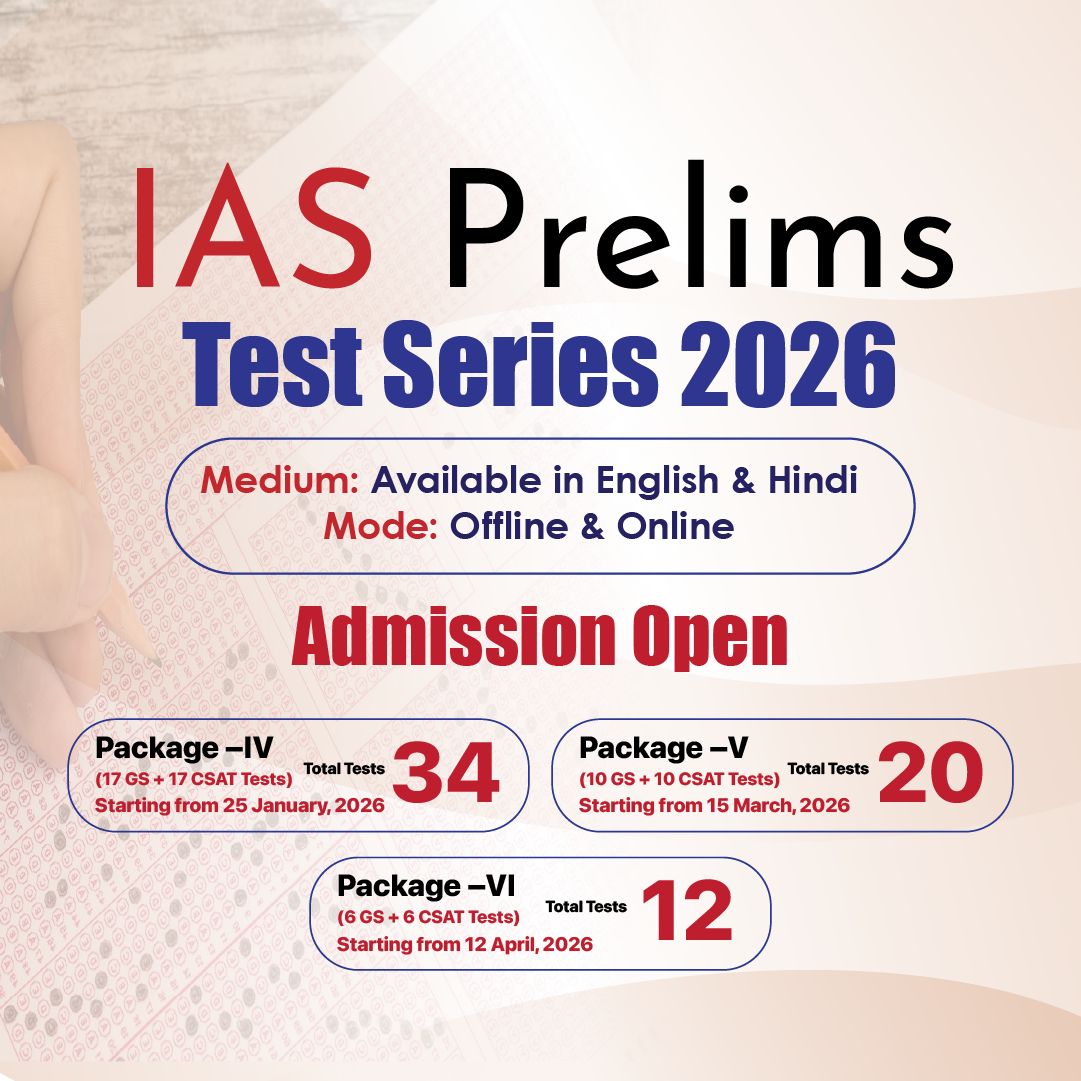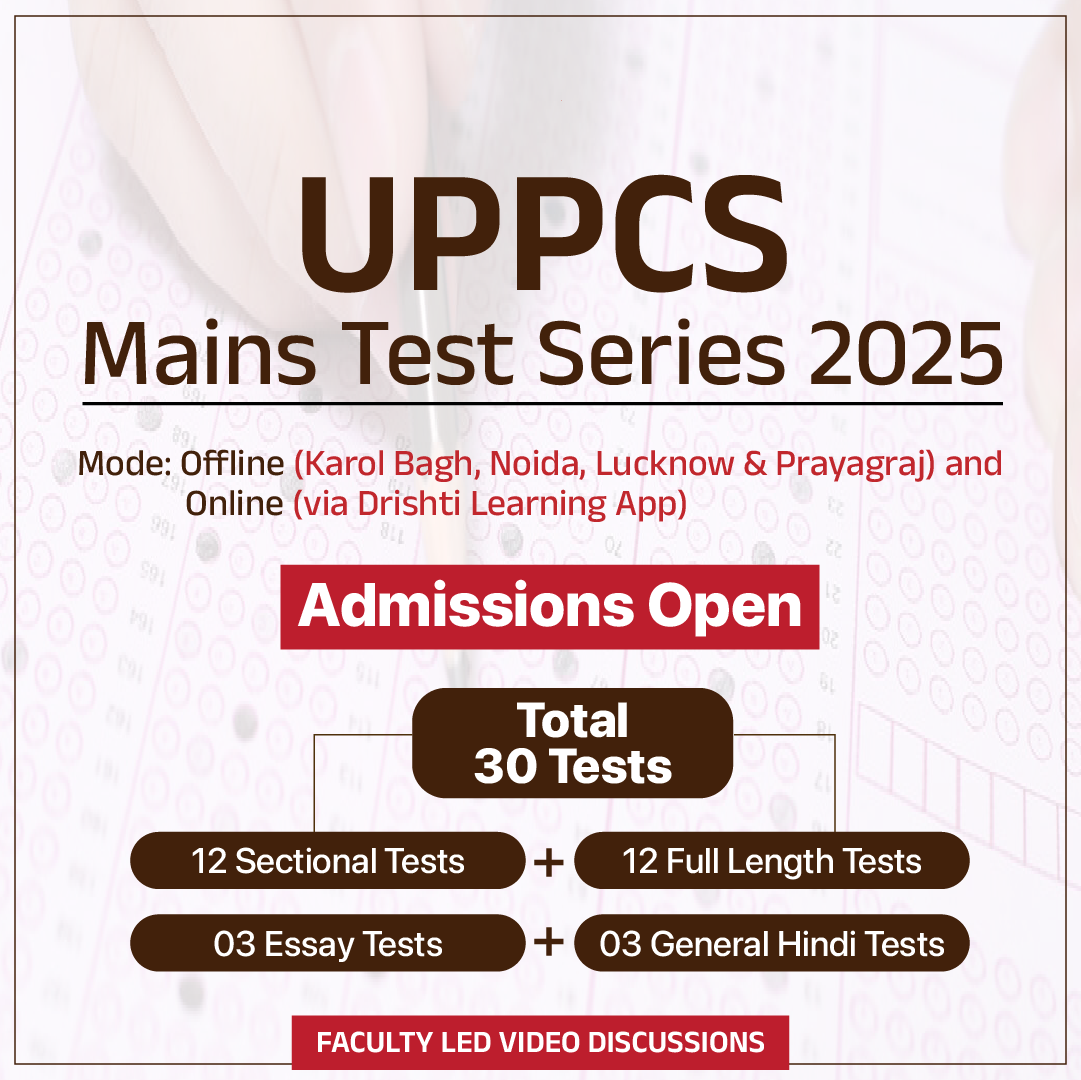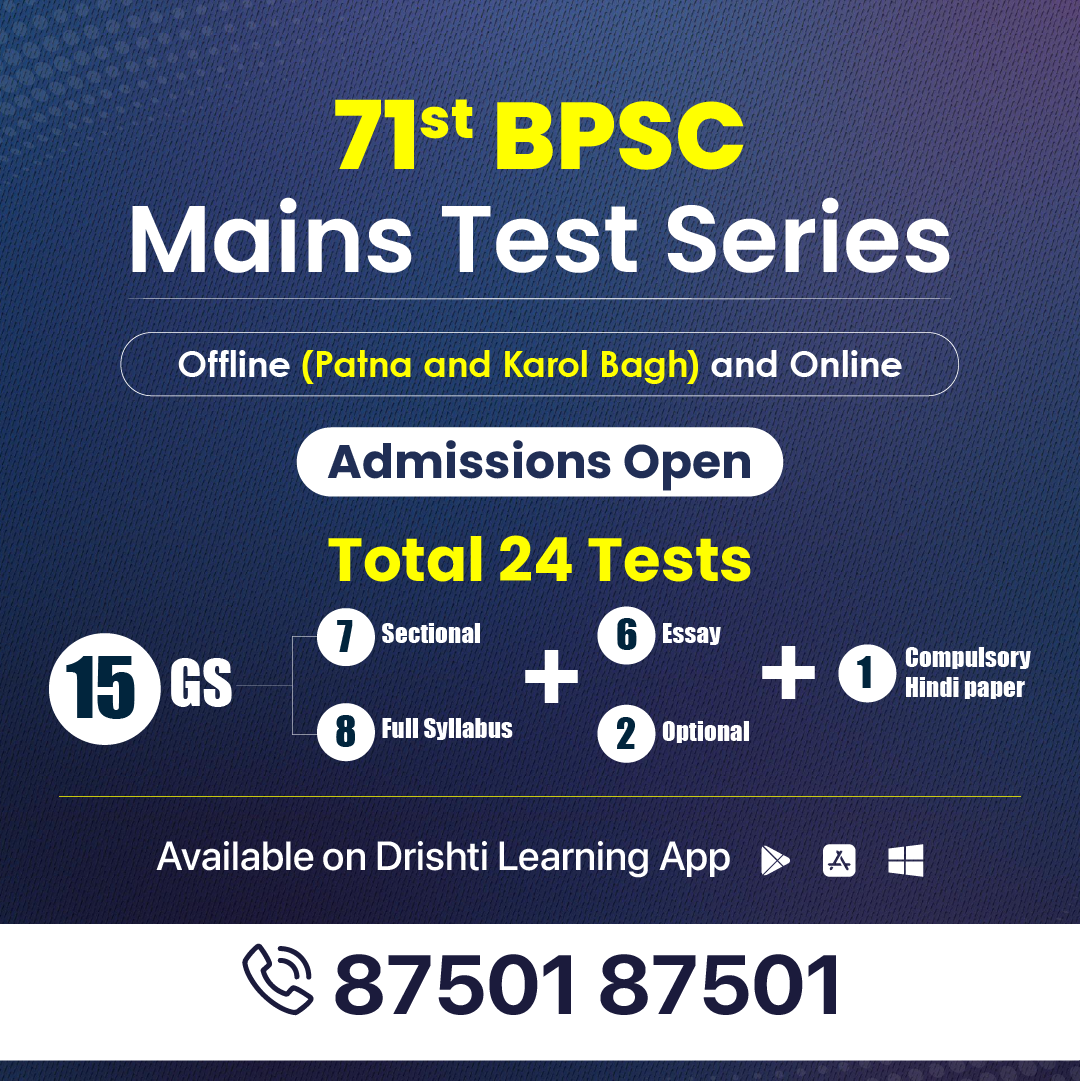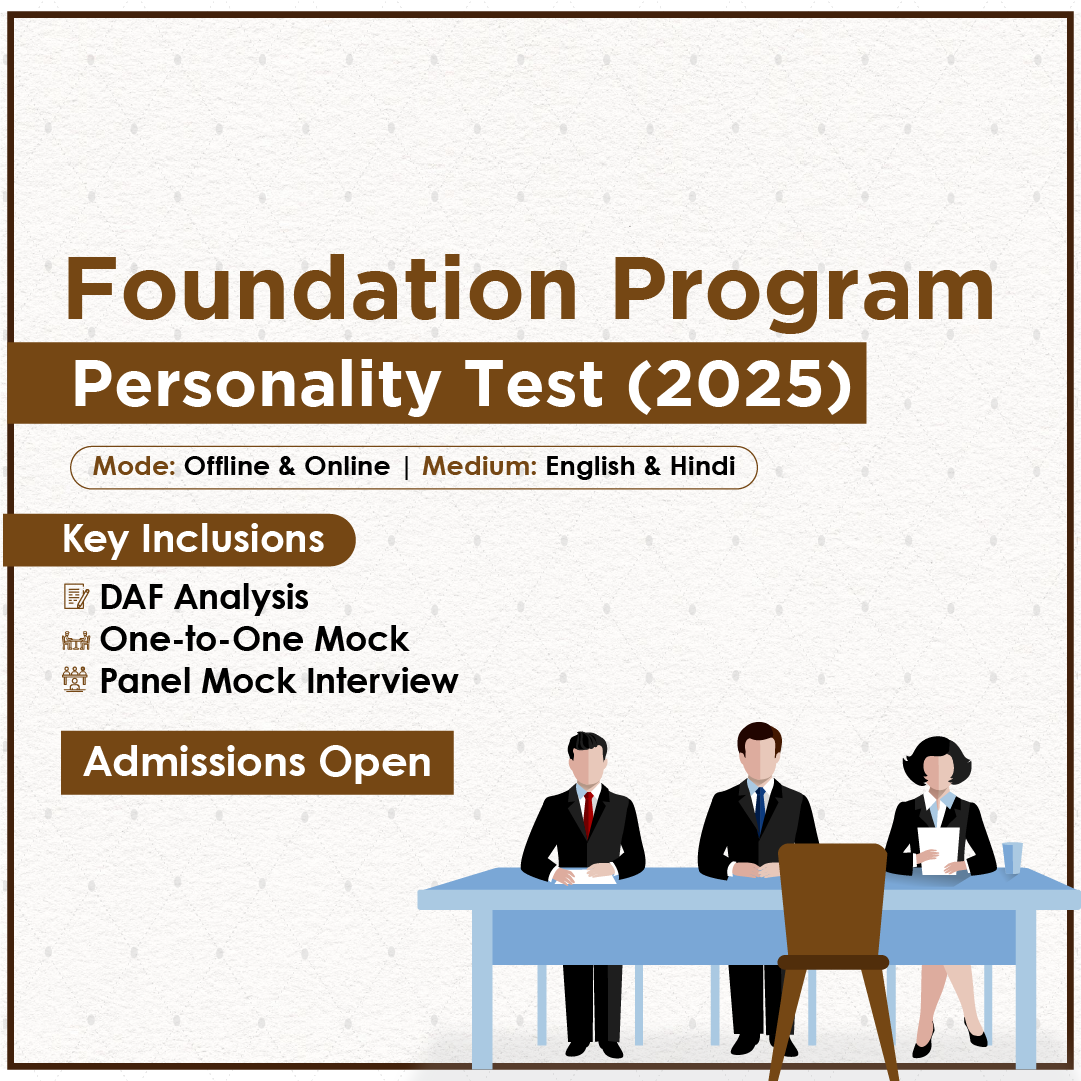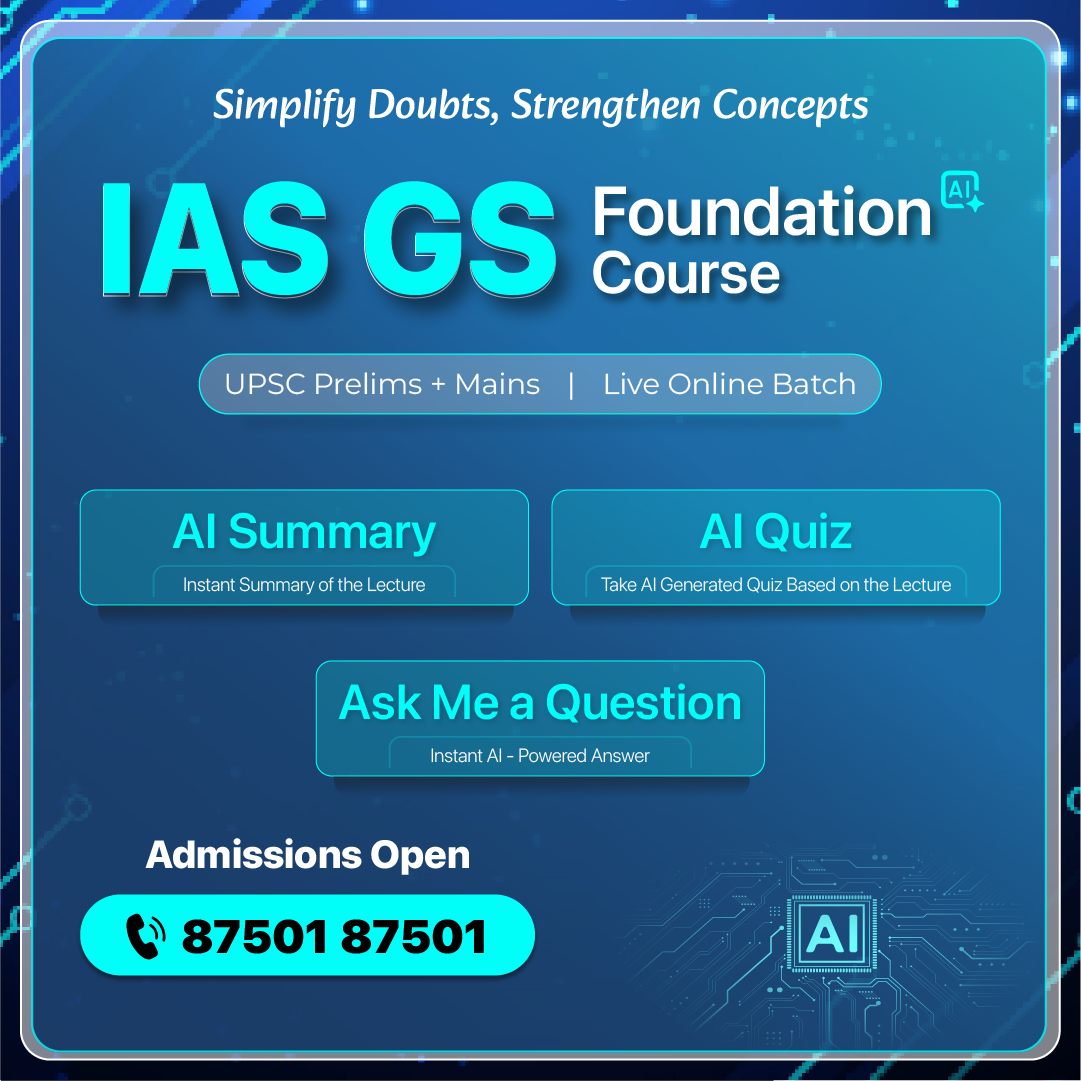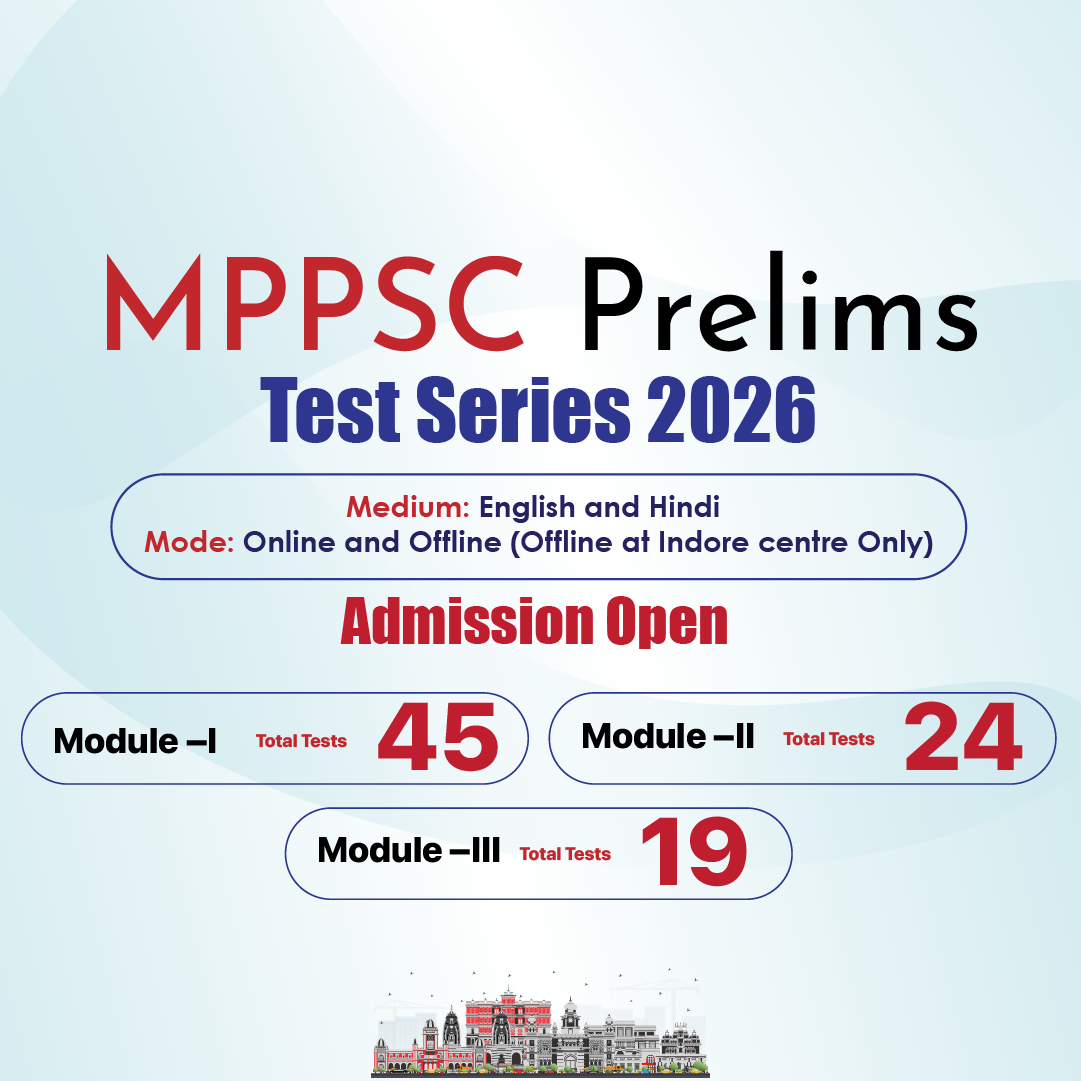Daily Free UPSC Mains Answer Writing Program
Prepare effectively for the UPSC Civil Services Mains Examination with our exclusive Daily Free Mains Answer Writing Practice Program tailored to meet the demands of UPSC aspirants. This program offers two UPSC-standard questions daily, meticulously designed to reflect the latest exam trends.
Each question is crafted to integrate current affairs with static topics, enabling aspirants to develop a well-rounded understanding of the syllabus. To help you excel, we provide detailed model answers/reference materials, equipping you with the tools to structure impactful responses and achieve high scores.
Our program also includes free answer evaluation. Aspirants can submit their answers and receive expert feedback to refine their writing skills. The evaluations focus on enhancing clarity, coherence, and precision—hallmarks of high-scoring answers in the Mains. Additionally, we offer guidance on essay writing, featuring well-researched topics, enriching reference materials, and free essay evaluations, empowering aspirants to excel in this crucial section of the exam.
Schedule for Daily Mains Answer Writing Program
| Day | Focus Area |
|---|---|
| Monday | GS Paper 1 – Indian Heritage, Culture, History, and Geography of the World and Society |
| Tuesday | GS Paper 2 – Governance, Constitution, Polity, Social Justice, and International Relations |
| Wednesday | GS Paper 3 – Economic Development, Science & Technology, Biodiversity & Environment, Security, and Disaster Management |
| Thursday | GS Paper 4 (Theoretical Questions) – Ethics, Integrity, and Aptitude |
| Friday | GS Paper 4 (Case Study) – Practical Ethical Scenario |
| Saturday | Essay Writing – Dynamic and well-researched topics |
Total Questions : 3000
-
Case Study
You have recently taken charge as the District Collector of a semi-urban district dealing with frequent encroachment disputes and rising public expectations from the administration. Soon after assuming office, you notice that one of your junior officers, Raghav, the Sub-Divisional Magistrate (SDM), has gained significant popularity on social media. He regularly posts updates of inspections, public interactions, and enforcement actions, portraying an image of an energetic and proactive officer. However, you gradually observe that his posts often include videos of surprise inspections, images of junior staff standing tensely behind him, and clips of punitive actions such as sealing shops—sometimes with strong captions like “Action speaks louder than words.” One such video of sealing a commercial establishment goes viral, drawing public praise but also criticism that procedural fairness was not clearly shown.
Colleagues quietly mention that this public display of authority may create more fear than trust. Shopkeepers tell a senior police officer that they hesitate to visit the SDM office, worried that ordinary grievances may be recorded and posted online. An informal complaint from a local MLA describes the SDM’s conduct as “high-handed” and motivated by publicity. An anonymous petition also reaches your office alleging inadequate notice in the sealing operation, although the official records show non-compliance.
You realise that the issue does not involve an obvious legal violation but presents subtle ethical dilemmas, the line between transparency and intimidation, the responsible use of social media, the dignity of individuals during enforcement, and the need for young officers to balance enthusiasm with institutional propriety.
As District Collector, you must decide how to address the situation while preserving administrative integrity, maintaining the morale of a promising officer, and ensuring that citizens do not feel humiliated or threatened by the misuse, intentional or unintentional, of official power.
Question:
Q1.Identify the core ethical issues involved in this case. Explain their relevance to public administration.
Q2. Do you think the SDM’s use of social media, though legal, raises ethical concerns? Justify your answer using principles of public service, propriety, and dignity of individuals.
Q3. As the District Collector, what steps will you take to address the situation in a fair, balanced, and constructive manner? Provide short-term and long-term measures.
Q4. Suggest a code of conduct or guidelines for civil servants’ use of social media that balances transparency, accountability, and ethical restraint.
12 Dec, 2025 GS Paper 4 Case Studies -
Q. “Despite unprecedented advances in genome engineering, synthetic human genome projects remain constrained by ethical and biosecurity concerns.” Discuss. (150 words)
11 Dec, 2025 GS Paper 4 Theoretical Questions -
Q. “Probity ensures the moral compass of a civil servant, while aptitude ensures functional excellence”. Elucidate with suitable examples . (150 words)
11 Dec, 2025 GS Paper 4 Theoretical Questions -
Q. CRISPR-based gene therapy has moved from laboratory research to clinical application within a decade.Discuss the scientific mechanism behind this therapy and evaluate its effectiveness based on recent global clinical outcomes. (250 words)
10 Dec, 2025 GS Paper 3 Science & Technology -
Q.“India’s fertilizer policy needs a paradigm shift from product-based subsidy to result-based nutrient management.” Discuss this in the context of the emerging role of nano fertilizers and precision agriculture. (250 words)
10 Dec, 2025 GS Paper 3 Economy -
Q. While digital governance initiatives aim to create more accountable and transparent governance,they often risk exacerbating existing socio-economic inequalities.Analyze this paradox in the light of India’s push of ‘ Digital Public Infrastructure’(DPI). (250 word)
09 Dec, 2025 GS Paper 2 Polity & Governance -
Q. “India’s approach to evolving multipolar world order is characterised by the Multi alignment and strategic autonomy.” Analyze the effectiveness of this approach in securing India’s core national interests,particularly in dealing with challenges posed by the rise of China. (250 words)
09 Dec, 2025 GS Paper 2 International Relations -
Q. “Contrast the bronze sculptural traditions of the Pala and Chola periods. How do these artistic divergences reflect the differing socio-religious environments of the two empires?” (150 words)
08 Dec, 2025 GS Paper 1 Indian Heritage & Culture -
Q. “The challenge is not only to remove colonial residues but to avoid creating new forms of intellectual dependence.” In the context of debates on decolonising education, analyse how India can strike a balance between indigenous ethos and scientific-temporal modernity. (250 words)
08 Dec, 2025 GS Paper 1 History -
Essay Topics:
1. The real voyage of discovery consists not in seeking new landscapes, but in having new eyes.
2. Power is meaningful only when it empowers others.
06 Dec, 2025 Essay Essay -
Case Study:
You are the Sub-Divisional Magistrate (SDM) of a flood-affected district. Thousands of people have been displaced in the recent floods. The state government has sent an emergency relief fund that is significantly lower than what is required. You are instructed to distribute it “based on urgency and vulnerability.”
However, you face the following situation:
1. Village A is politically influential. The local MLA pressures you to allot a major share of relief funds there. He hints that “future cooperation” will depend on your decision.
2. Village B is severely affected, but it has poor road connectivity. Delivering aid there will take extra time and resources.
3. Village C has fewer casualties but houses a large migrant labour population that lacks documents required for official relief distribution.
4. Your field staff privately suggests that you divert some funds for logistics (vehicles, fuel, meals). Official guidelines prohibit this, but without these expenses, delivery to remote areas will be delayed.
5. The media is reporting that the administration is “slow and careless,” adding further pressure.
You must decide how to allocate the limited resources fairly, efficiently, and ethically, while handling political pressure, administrative constraints, and humanitarian concerns.
Question:
Q1. Identify the major ethical issues involved in this situation.
Q2. As the SDM, outline the options available to you. Evaluate each option using ethical principles.
Q3. What would be your final course of action? Justify your decision with proper reasoning, referencing ethical theories and principles of public service.
05 Dec, 2025 GS Paper 4 Case Studies -
Q. “Integrity is less about resisting temptation and more about eliminating situations that generate temptation.” Discuss. (150 words)
04 Dec, 2025 GS Paper 4 Theoretical Questions -
Q. “Emotions are not obstacles to ethical reasoning; they are its raw material.” Examine the statement in the context of public service decision-making. (150 words)
04 Dec, 2025 GS Paper 4 Theoretical Questions -
Q. “Without a strong deep-tech industrial base, India risks remaining a user- rather than a shaper- of frontier technologies.” Evaluate India’s ability to commercialise deep-tech research in space tech, med-tech, and clean tech. (250 words)
03 Dec, 2025 GS Paper 3 Science & Technology -
Q. “Ecosystem services are undervalued in economic policymaking, undermining both development and sustainability.” Assess India’s efforts to integrate ecosystem valuation into decision-making. (250 words)
03 Dec, 2025 GS Paper 3 Bio-diversity & Environment -
Q. “India’s rise will depend not only on power projection but on norm-setting in the global order.”
02 Dec, 2025 GS Paper 2 International Relations
Analyse India’s ability to shape global rules on technology, trade, and climate. (150 words) -
Q. “The Indian model of secularism is not about the separation of religion and State, but the principled engagement of the State with all religions.”Discuss this statement in light of recent policy debates. (250 words)
02 Dec, 2025 GS Paper 2 Polity & Governance -
Q. “Indian urbanisation is not merely a demographic shift but a civilizational transformation.” Analyse how this transformation is reshaping identities, social relations, and spatial inequalities. (250 words)
01 Dec, 2025 GS Paper 1 Indian Society -
Q. Discuss the significance of the Gupta period in shaping the foundations of classical Indian culture. How far can it be considered a “Golden Age”? (150 words)
01 Dec, 2025 GS Paper 1 Indian Heritage & Culture -
Essay Topics
1. The real voyage of discovery consists not in seeking new landscapes but in having new eyes.
2. Justice is the first condition of humanity.
29 Nov, 2025 Essay Essay -
Case Study
Meera Rao, the District Magistrate of an expanding industrial district, is confronted with increasing incidents of language-based violence targeting migrant labourers arriving from different parts of the country. In recent weeks, several troubling events have created a climate of fear. A group of construction workers was beaten by local youth for not speaking the regional language. Two delivery workers were humiliated and forced to record apology videos for using their mother tongue. A factory supervisor allegedly denied work shifts to labourers who could not communicate in the local language.
Hospitals report a visible rise in assault cases involving migrant workers. Police inputs indicate that intimidation is being coordinated through social media groups that promote linguistic purity and urge locals to reclaim jobs. Investigators also suspect that some cultural organisations with political influence are indirectly escalating tensions by encouraging divisive narratives during public gatherings.
Meera drafts a multi-layered plan that includes strict legal action under relevant provisions, a multilingual grievance helpline, sensitisation programmes in industrial areas, mandatory anti-discrimination guidelines for factories, and partnerships with labour unions and community groups.
Opposition to her plan emerges immediately. Local trade associations fear that strict policing will disrupt hiring practices and harm small industries already facing economic stress. Cultural groups accuse the administration of undermining regional identity and argue that the increasing presence of migrants is eroding local culture. A few media channels portray Meera’s efforts as an attempt to favour outsiders, deepening the polarisation. Some political leaders privately advise her to slow down due to the sensitivity of the upcoming elections.
Simultaneously, labour welfare organisations, rights-based NGOs, and several industrialists express deep concern. They warn that delayed action will embolden extremist behaviour and cause large numbers of migrant workers to flee the district. This could severely disrupt essential services, supply chains, and industrial production. Meera feels torn between the duty to safeguard vulnerable workers and the need to maintain social stability, between enforcing the law with firmness and respecting cultural identity, and between administrative neutrality and political pressure.
Questions:
1. What are the main ethical dilemmas Meera faces in this situation?
2. Identify and analyse the conflicting values and principles involved in this case.
3. Evaluate the possible courses of action available to Meera and their likely consequences.
4. What should be Meera’s most ethical and administratively sound course of action to address language-based violence against migrant labourers? (250 words)
28 Nov, 2025 GS Paper 4 Case Studies -
Q. “Innovation without compassion leads to exploitation.”In the era of AI, surveillance technologies, and digital monopolies, what ethical principles should technologically advanced nations uphold to prevent digital colonisation and ensure equitable technological access worldwide? (150 words)
27 Nov, 2025 GS Paper 4 Theoretical Questions -
Q. “A civil servant’s success depends more on emotional competence than on cognitive ability.” Do you agree? Substantiate with examples. (150 words)
27 Nov, 2025 GS Paper 4 Theoretical Questions -
Q. COP30 reflects both the potential and the limits of multilateral climate cooperation. Discuss the key strengths and structural weaknesses of the present global climate governance. (250 words)
26 Nov, 2025 GS Paper 3 Bio-diversity & Environment -
Q. Critically evaluate the significance of India’s recent labour reforms under the four new Labour Codes. (250 words)
26 Nov, 2025 GS Paper 3 Economy -
Q.“India’s engagement with Africa has moved towards a development-centric and demand-driven partnership. Critically evaluate the key drivers and challenges shaping this evolving relationship. (250 words)
25 Nov, 2025 GS Paper 2 International Relations -
Q. Compare and contrast the doctrine of Parliamentary supremacy in the UK with the concept of Constitutional supremacy in India. (150 words)
25 Nov, 2025 GS Paper 2 Polity & Governance -
Q. Dead zones are expanding rapidly in world oceans due to a combination of anthropogenic and climate-related factors. Examine the causes, assess their impact on marine ecology and coastal economies, and propose policy-level solutions. (250 words)
24 Nov, 2025 GS Paper 1 Geography -
Q. The 1920s marked a shift from a single-stream nationalist struggle to a multi-ideological movement. Examine how diverse ideological currents shaped the character of India’s freedom struggle during this decade. (150 words)
24 Nov, 2025 GS Paper 1 History -
Case Study
Ritika Sharma, the District Magistrate of a rapidly developing district, is confronted with worrying reports of a steady rise in drug use among students and young professionals. Over the past few weeks, multiple incidents have raised alarms: five college students were admitted to the district hospital after consuming synthetic drugs at a birthday party; police intercepted a courier parcel containing narcotics disguised as health supplements; and several school counsellors reported behavioural changes and absenteeism linked to possible substance abuse.
Preliminary investigations reveal that drugs are being distributed through encrypted messaging apps and anonymous digital wallets. Intelligence inputs point toward a network involving a local nightclub owner, a few influential businessmen, and some college staff who allegedly “look the other way” during campus events. Ritika proposes a plan involving targeted NDPS enforcement, surprise inspections, mandatory counselling sessions in institutions, and collaboration with parents and community groups.
However, as soon as the proposal is made public, pushback begins. Parents’ associations accuse the administration of “criminalising youth experimentation” and argue that harsh action may stigmatise students. The nightclub and hospitality lobby warns that raids and strict policing will harm the district’s business climate. A few NGOs frame the administration’s approach as intrusive and insist that addiction should be treated primarily as a health and rights-based issue. Local media channels run debates portraying the crackdown as moral policing rather than a public safety necessity. Politically connected individuals try to influence Ritika, advising her to avoid taking decisions that may create controversy before the upcoming local elections.
Simultaneously, the district’s anti-narcotics unit warns that delay could allow the emerging drug network to become entrenched. Medical professionals highlight a sharp increase in substance-related emergency cases and caution that untreated early-stage addiction can quickly escalate. Ritika finds herself torn between safeguarding youth welfare and respecting personal freedoms, between enforcing the law firmly and adopting a compassionate, rehabilitation-oriented approach. She is aware that her decision will have long-term implications for public health, administrative credibility, and trust between the youth and the state.
Questions
1. What are the main ethical dilemmas Ritika faces in this situation?
2. Identify and analyse the conflicting values and principles involved in this case.
3. Evaluate the possible courses of action available to Ritika and their likely consequences.
4. What should be Ritika’s most ethical and administratively sound course of action to address the rising drug problem?
21 Nov, 2025 GS Paper 4 Case Studies


